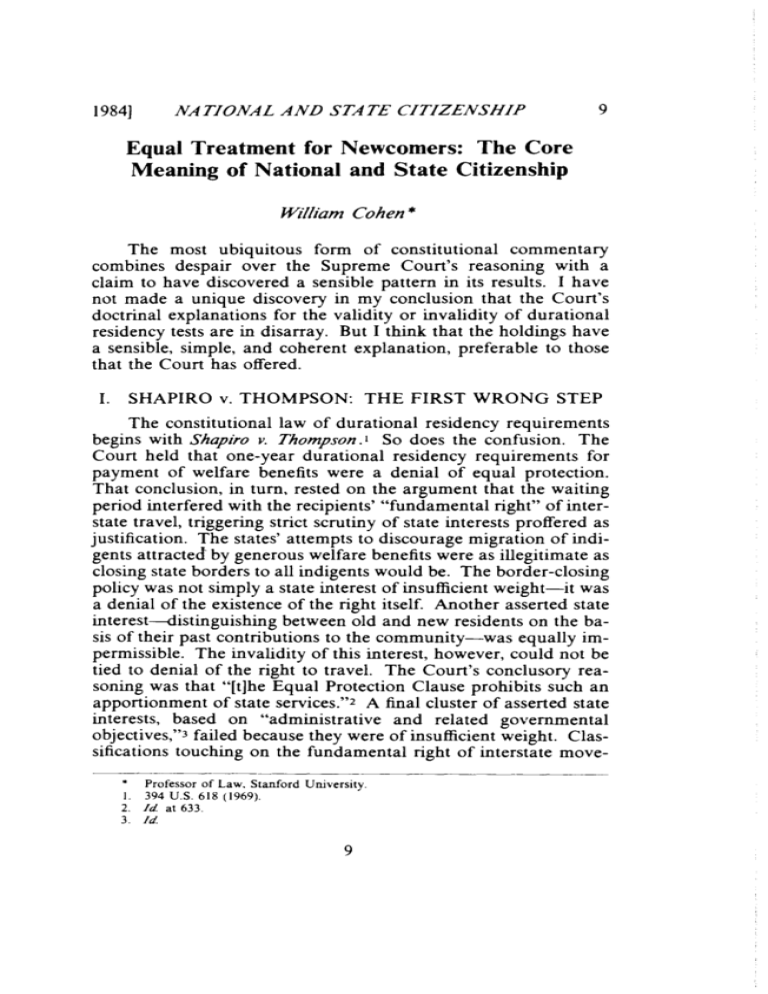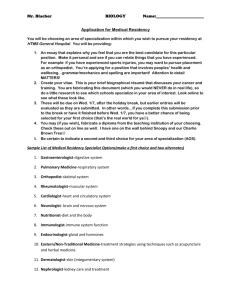01_01_Cohen
advertisement

NATIONAL AND STATE CITIZENSHIP 1984] 9 Equal Treatment for Newcomers: The Core Meaning of National and State Citizenship Wi//iam Cohen* The most ubiquitous form of constitutional commentary combines despair over the Supreme Court's reasoning with a claim to have discovered a sensible pattern in its results. I have not made a unique discovery in my conclusion that the Court's doctrinal explanations for the validity or invalidity of durational residency tests are in disarray. But I think that the holdings have a sensible, simple, and coherent explanation, preferable to those that the Court has offered. SHAPIRO v. THOMPSON: THE FIRST WRONG STEP I. The constitutional law of durational residency requirements begins with Shapiro v. Thompson. 1 So does the confusion. The Court held that one-year durational residency requirements for payment of welfare benefits were a denial of equal protection. That conclusion, in tum, rested on the argument that the waiting period interfered with the recipients' "fundamental right" of interstate travel, triggering strict scrutiny of state interests proffered as justification. The states' attempts to discourage migration of indigents attracted by generous welfare benefits were as illegitimate as closing state borders to all indigents would be. The border-closing policy was not simply a state interest of insufficient weight-it was a denial of the existence of the right itself. Another asserted state interest-distinguishing between old and new residents on the basis of their past contributions to the community-was equally impermissible. The invalidity of this interest, however, could not be tied to denial of the right to travel. The Court's conclusory reasoning was that "[t]he Equal Protection Clause prohibits such an apportionment of state services."2 A final cluster of asserted state interests, based on "administrative and related governmental objectives,''3 failed because they were of insufficient weight. Classifications touching on the fundamental right of interstate move• I. Professor of Law. Stanford University. 394 U.S. 618 (1969). ld at 633. 2. 3. fd 9 10 CONSTITUTIONAL COMMENTARY [Vol. 1:9 ment could be justified only by compelling state interests-<>nes beyond mere administrative convenience. Particularly, the argument that a one-year durational residency requirement was a good rule of thumb for determining residency could not "withstand scrutiny." Two aspects of the Shapiro opinion were sure to cause trouble. First, the Court's unsupported conclusion that the equal protection clause forbids the allocation of state services to longterm residents needed elaboration. Why aren't the past contributions of the old-timers an adequate justification? And how, if at all, does this ruling relate to the Court's principal right-to-travel theme? In the case of indigents, it was plausible to argue that a one year hiatus in reception of welfare benefits made migration to a new state practically impossible. But that rationale would allow the state to bar new arrivals--even indigent ones-from other state services such as public libraries. It seems unlikely that this was the Court's intention. We are thus left to speculate about why states cannot favor long-term residents over recent arrivals in the allocation of state services. Some sort of fundamental right must be at stake. This seems to follow from the Court's rejection of the strong administrative convenience argument in Shapiro. If the state can limit largess from its treasury to bona fide residents, and if residence turns on subjective intention, a durational residency test designed to weed out those with no intent to remain hardly seems irrational. And, if no fundamental right is at stake, it is hard to see why the Constitution requires the "less drastic means" of case-by-case scrutiny of domiciliary intent. II. PENALIZING THE RIGHT TO TRAVEL The Court's next encounters with durational residency requirements added a new layer of complexity to the analysis. Dunn v. Blumstein4 invalidated lengthy durational residency requirements for voting. Significantly, the Court's opinion did not end with its rationale pegged to the voting right cases, but went on to support the result under the right to travel analysis of Shapiro. How could a durational residency requirement for voting burden the right to interstate travel, when no one seriously argued that anyone would defer a move because of temporary exclusion from the franchise? The less than obvious answer was that Shapiro didn't rest, after all, on the proposition that durational residency requirements for welfare were intended to deter, or in fact de4. 405 U.S. 330 (1972). 1984] NATIONAL AND STATE CITIZENSHIP II terred, travel. The actual plaintiffs in Shapiro had not been deterred from moving. The gist of their constitutional complaint was that the states had penalized the exercise of the right to travel, because a durational residency requirement operates to exclude only those who exercise the right of interstate migration. The penalty rationale became the centerpiece of the decision in Memorial Hospital v. Maricopa County, s invalidating a one-year residency requirement for free medical care. Arizona made the predictable argument that indigents were not likely to be deterred from migrating to Arizona by the knowledge that non-emergency medical care would not be provided in their first year there. The Court began its response with the proposition that the right to travel had been involved in Shapiro in "only a limited sense."6 The right at issue was the right to migrate, with a permanent intent to settle. Nor was the question limited to an inquiry whether temporary denial of benefits deterred exercise of the right. Strict scrutiny was triggered by durational residency requirements that were a penalty for recent interstate migration. Whether a durationa! residency requirement for receipt of state benefits was a penalty depended on the nature of the benefit. If the benefit denied was a "basic necessity of life,"? a durational residency requirement was a penalty. The penalty rationale had an implicit negative pregnant. If a state denied services to newcomers, strict scrutiny was not required if migration was not deterred, and the services were not "basic necessities of life." The negative side of the penalty rationale could explain the Court's dictum a year earlier, in nandis v. Kline, s that a one-year durational residency requirement for lower in-state tuition in a state university was permissible. But it hardly explained the holding in nandis that Connecticut's rule freezing students in out-of-state status during their college careers for tuition purposes was invalid. In reaching that result, the Court had abandoned equal protection analysis for a puzzling procedural due process rationale. Since the state purported to be concerned with residency, it was procedurally unfair to prevent students from proving that they had become residents, by creating an irrebutable presumption of non-residency. 5. 415 u.s. 250 (1974). 6. ld at 255. 7. ld at 259. 8. 412 U.S. 441,452-53 (1973). The dictum was supported by two earlier decisions. Starns v. Malkerson. 326 F. Supp. 234 (D. Minn. 1970). ajf'd mem. 401 U.S. 985 (1971); Kirk v. Board of Regents. 273 Cal. App. 2d 430, 28 Cal. Rptr. 260 (Ct. App. 1969), appeal dismissed, 396 U.S. 554 (1970). 12 CONSTITUTIONAL COMMENTARY [Vol. 1:9 After the Court's brief love affair with irrebutable presumptions had come to an end,9 it was tempting to dismiss the holding in Vlandis as an aberration. It appeared that constitutional law concerning residency requirements had run its course-that they were invalid only when imposed as tests for voting and for vital state services for indigents. The broad, and unexplained, statement in Shapiro that the equal protection clause prohibits giving greater state services to long-time residents seemed to be a museum piece. That impression was fortified by the result in Sosna v. Iowa, to where a one-year residency requirement for bringing divorce actions against non-residents was upheld. The one unusual feature of that opinion was that it scrupulously avoided the penalty rationale, which could have supported the result. Justice Rehnquist explained that previous cases striking down durational residency requirements had been those in which the only justifications asserted were "budgetary or recordkeeping considerations."•• Durational residency requirements that further other kinds of interests-here Iowa's concern that it not become a divorce millwould be upheld. If Sosna's opinion were taken seriously, even the stripped-down rationale of Memorial Hospital and Vlandis would be in jeopardy. Perhaps it is fortunate that Sosna marked the beginning of the Court's sabbatical on the durational residency issue. For seven years, Court watchers were spared the pain of reading one more case that explained that the rationale of the previous cases wasn't quite right, and added one more layer of tar to the analytical highway. Hope sprang eternal that, refreshed from its seven years of repose, the Court would supply some sensible and predictable approach to the riddle of durational residency requirements. III. THE ALASKA OIL BONUS CASE Ronald and Patricia Zobel were "Cheechakos," a not entirely neutral term applied by Alaskans to newcomers. They made their welcome to Alaska less hospitable by bringing suit to challenge two 1980 measures designed to give long-term Alaskans a disproportionate share of the state's oil wealth. First was a measure giv9. See, e.g., Usery v. Turner Elkhorn Mining Co .. 428 U.S. I (1976); Weinberger v. Salfi, 422 U.S. 749 (1975). But cf. Turner v. Department of Employment. 423 U.S. 44 (1975). 10. 419 U.S. 393 (1975). II. /d at 406. 1984] NATIONAL AND STATE CITIZENSHIP 13 ing residents a one-third exemption from state income taxes for each year of residence, operating to excuse anyone with three or more years of residence from payment. Second, and more significant, was a measure distributing a portion of Alaska's mineral income fund earnings to state citizens, with varying amounts based on length of residence. (One dividend unit-worth $50 in 1980was paid to each adult Alaskan for each year of residency after 1959.) Since the Zobels had lived in Alaska only since 1978, they were required to pay some income tax, and were scheduled toreceive only a small payment from the fund. After listening to an oral argument carried on live television throughout the state, the Alaska Supreme Court concluded that the income-tax-forgiveness provisions were invalid under the Alaska Constitution, but that the fund payment structure violated neither the state nor the Federal Constitution.12 The decisions were by shifting 3-2 votes, with only one justice in the majority in both cases. Significantly, the court began with the understandable assumption that neither measure triggered strict scrutiny under the Federal Constitution, since new residents were not deterred from moving to Alaska, and were not being denied vital state services. It applied, however, an intermediate level of scrutiny under the state constitution. The tax measure did not survive that scrutiny, but the fund payment provisions did-at least in the eyes of Chief Justice Rabinowitz, who cast the deciding vote in both cases. Before the United States Supreme Court, Alaska could argue confidently that distinctions based on length of residence, for distribution of non-vital state benefits, need only be "minimally rational." Awarding larger payments to older residents served three purposes. Most important, it encouraged Alaskans not to vote for immediate distribution of the fund. (If any distributions had to be shared equally with future newcomers, present residents would be tempted to increase their share by requiring larger current distributions.) Second, with increased benefits for each year of residence, there would be an incentive for Alaskans to remain in the State to reap the increased benefits. Finally, the benefit scheme rewarded long-time residents for their past contributions. In rejecting Alaska's arguments, Chief Justice Burger's opinion for the Court in Zobel v. Williams 13 found that it was unnecessary to challenge Alaska's assumption that the law need meet only the test of minimal rationality, because the "scheme cannot pass 12. 13. Williams v. Zobel, 619 P.2d 422 (Alaska 1980). 102 S. Ct. 2309 (1982). 14 CONSTITUTIONAL COMMENTARY [Vol. 1:9 even the minimal test."t 4 The problem with Alaska's first two arguments was that both objectives could have been adequately attained by merely granting greater dividends for years of residency after enactment of the measure, without also crediting years of past residence going back to the year of statehood of Alaska. The final objective-rewarding past contributions-was, obviously, served well by the challenged statutory classification. That objective, however, was not legitimate at all. It should be obvious that the decision marks a sharp break with the apparent pattern established by the earlier durational residency cases. It is just as obvious that the rationale is even more opaque than that supplied by the string of previous opinions.ts It was not necessary for Alaska to extend its residence preference back twenty-one years to encourage Alaskans not to dissipate the oil funds, or to stay in the State, but the lack of that necessity hardly demonstrates irrationality. Chief Justice Burger stated that the Alaska Supreme Court had itself concluded that the retroactive awarding of residence seniority was not rationally related to the asserted objectives.t6 That court, however, was operating on the assumption that its state constitution required more than minimal rationality. On that analysis, giving greater rewards to those who had been in the state longest required a special justification. Whether strict scrutiny was required by the United States Constitution was an issue the Chief Justice purported not to reach.t 7 The heart of the opinion nevertheless required more than minimal scrutiny, because it concluded that rewarding past contributions to the state is not a permissible objective. The Chief Justice relied on the unexplained dictum in Shapiro v. Thompson that the equal protection clause forbids apportionment of state benefits on the basis of length of residency.ts The reach of that dictum is, indeed, expanded with a paragraph suggesting that durational residency requirements for payment of state services will almost always be unconstitutional. If the States can make the amount of a cash dividend depend on length of resi- 14. !d at 2313. 15. The Chief Justice masked a major constitutional change with an ostensible rational basis scrutiny in Reed v. Reed, 404 U.S. 71 (1971). See also Richmond Newspapers. Inc. v. Virginia, 448 U.S. 555 (1980); Fullilove v. K.lutznick, 448 U.S. 448 (1980). 16. Zobel, 102 S. Ct. at 2313. 17. !d 18. Shapiro, 394 U.S. at 632-33. The Zobel opinion also relied on a statement in Vlandis that apportionment of tuition rates on the basis of duration of residency would give rise to "grave" equal protection problems. 412 U.S. at 450 n.6. 1984] NATIONAL AND STATE CITIZENSHIP 15 dence, what would preclude varying university tuition on a sliding scale based on years of residence-or even limiting access to finite public facilities. eligibility for student loans, for civil service jobs, or for government contracts by length of domicile? Could States impose different taxes based on length of residence? Alaska's reasoning could open the door to state apportionment of other rights, benefits and services according to length of residency. It would permit the states to divide citizens into expanding numbers of permanent classes. Such a result would be clearly impermissible.19 As Justice Rehnquist observed in his solo dissent, none of this is the stuff of minimal scrutiny. States cannot constitutionally reward longer residence with greater benefits. Other justifications for accomplishing that result obviously need to be washed in acid. But where does the constitutional right to equal treatment, that the Zobels had successfully vindicated, come from? To their credit, five Justices, including four who had concurred in the Court's opinion, tried to offer further enlightenment. Justice Brennan's concurring opinion, joined by three other Justices, retains much of the structure of his opinion for the Court in Shapiro v. Thompson. The beginning of the analysis is still interstate mobility: "[l]f each State were free to reward its citizens incrementally for their years of residence, . . . a citizen leaving one State would thereby forfeit his accrued seniority, only to have to begin building such seniority again in his new state of residence."2o As in Shapiro, the distinct conclusion that it is illegitimate to reward citizens for past contributions rests on another ground: "[T]he acknowledged illegitimacy of that state purpose has a different heritage-it reflects not the structure of the Federal Union but the idea of constitutionally protected equality."21 One cannot quarrel with Justice Brennan's evident desire for some firmer ground than interference with interstate movement. For as Justice Rehnquist pointed out in dissent, it is difficult to believe that Alaska's scheme of giving more money to earlier residents would affect anyone's decision to move to Alaska. In fact, Alaska's scheme of paying out its riches might attract newcomers to Alaska, although concededly not as many as equal shares for newcomers. (It would attract more newcomers than wasteful spending of Alaska's oil riches!) The second rationale completely abandons the mobility motif, but employs a more puzzling theme of equality. Surely, the problem is not one of a generalized principle requiring equal per capita distribution of the state treasury. Some principle is operat19. 20. 21. Zobel, 102 S. Ct. at 2314-15 (footnotes omitted). /d at 2317. ld 16 CONSTITUTIONAL COMMENTARY [Vol. 1:9 ing here that is irrelevant when the state decides to favor its farmers over its mechanics, or to redistribute income from the young to the old. Justice O'Connor's separate concurrence is novel, and the most interesting opinion in the set. Her criticisms of the Court's opinion apply, at least in part, to Justice Brennan's opinion as well. Is it truly illegitimate to reward citizens for their past contributions, even ifthe reward is not graded by years of past residency in the state? If that is the only illegitimate purpose, will states be able to conjure up other purposes to support schemes giving greater benefits to long-term residents? Justice O'Connor would have rested the decision on the privileges and immunities clause of article IV. Initially, that looks like a curious location for constitutional attack against durational residency requirements. Both the Court,22 and Justice Rehnquist,23 observed that article IV applies to distinctions between state citizens and citizens of other states-not to distinctions among a state's citizens. Moreover, the state privileges and benefits that have been involved in durational residency cases are concededly those that a state can limit to its own citizens. Justice O'Connor's answer is that a right of citizens of states other than Alaska is implicated by the right to move to Alaska and settle. "Each group of citizens who migrated to Alaska in the past, or chooses to move there in the future, lives in the State on less favorable terms than those who arrived earlier."24 Invoking article IV jurisprudence, Justice O'Connor argued that Alaska could not choose to give lesser benefits to new residents unless new residents were the "peculiar source" of the evil addressed by the disbursement scheme, and the disbursement scheme bore a substantial relationship to curing that malady.2s Zobel has, happily, rescued the constitutional law of durationa! residency requirements from the limbo to which Justice Rehnquist's opinion in Sosna threatened to consign it. There is a substantial, and reliable, constitutional right of newcomers to insist on an equal share of state benefits and services. At the same time, we know that some durational residency requirements-including those for bringing a divorce action and paying lower instate tuition in a state university-will be upheld. The doctrinal 22. Jd at 2312 n.5. Four of the Justices who joined the opinion. however, also joined in a concurrence that characterized Justice O'Connor's anicle IV theory as "plausible." Id at 2316. 23. Jd at 2325. n.3. 24. Jd at 2321. 25. /d 1984] NATIONAL AND STATE CITIZENSHIP 17 cacophony in Zobel makes it difficult to predict whether durationa! residency requirements will be upheld in contexts not addressed by the Court, and what are the appropriate bases of decision. IV. EQUAL STATE CITIZENSHIP FOR NEWCOMERS The only hope for analysis is a new beginning, abandoning / the doctrinal false leads of burdens or penalties on the right to travel or migrate, equal protection, and strict scrutiny. The new citizen's right to equality depends on none of those things. It is important, at the outset, to remember that the problem has arisen in the context of state privileges and benefits that the state can limit to its own citizens. Such discrimination between citizens and non-citizens is permitted despite the prima facie command of article IV's privileges and immunities clause, requiring equality of treatment between state citizens and citizens of other states. The obvious explanation is that the reality of the existence of states qua states, rather than as departments of a national government, requires a conception that the state's citizens own state-owned resources, and that a state is not required to share its treasury with the nation at large.26 The states' power to limit the distribution of communityowned resources to members of the community is subject to an obvious corollary. One aspect of full sovereignty denied to the states is the power to determine membership in the community. Under the fourteenth amendment, any United States citizen becomes a full-fledged member of the state community immediately upon establishing residence there. (If forced to find a constitutional text as the home for this concept, I would elect the privileges and immunities clause of the fourteenth amendment. Whatever rights may attach to the conception of United States citizenship, the least controversial should be that of free choice of state citizenship.) A state's decision that old-timers deserve a greater share of state-owned resources cannot be squared with a constitutional structure that demands that newcomers be treated as full members of the state community. The strict scrutiny-equal protection approach of Shapiro suggests that there are competing policies that will be sufficiently weighty to override the constitutional command of equality for 26. Justice Brennan remarked, in his concurrence, that permitting states to offer benefits and services to their citizens "inheres in the very idea of maintaining the States as independent sovereigns." ld at 2317. For an excellent and detailed exposition. see Varat. State "Citizenship" and Interstate Equali~l'. 48 U. CHI. L. REv. 487 (1981). 18 CONSTITUTIONAL COMMENTARY [Vol. 1:9 newcomers. Similarly, Justice O'Connor's article IV structure allows newcomers to be given second class status if they are sources of an "evil" that can be corrected by denying them benefits. (She explains Sosna on the ground that granting divorces to newcomers might tempt other states to refuse recognition to divorce decrees granted those new residents.) Such balancing of interests is inappropriate in this context. A constitutional structure demanding equality for new citizens cannot yield to competing substantive policies, any more than can the constitutional command that all persons born in the United States are citizens of the United States and citizens of the state in which they reside. The validity of a state durational residency requirement does not depend on whether there are exceptions to the principle of equality for newcomers. It rests on the correlative principle that there are state benefits that can be limited to citizens. There is a substantial problem in the dependency of residency, the constitutional test for state citizenship, on a mental state. If the benefit is sufficiently large, the state can legitimately be concerned that noncitizens are asserting false claims. There are situations where a durational residency requirement fits quite nicely with paired constitutional conceptions that benefits can be limited to a state's citizens, but that newly arrived citizens are entitled to full equality. On the other hand, an assertion by the state that its durational residency requirement is a test for bona fide citizenship must be acid-washed to insure that it is not a pretext for discriminating against new arrivals in the distribution of benefits. Applying that approach, the results reached by the Court are plausible. Zobel is the easiest case, since Alaska's twenty-one classes of citizens cannot be justified as a scheme to test honesty of domiciliary intent. Counsel asserted in Shapiro that the durationa! residency test was a means of insuring accuracy of the residency determination, but the Court properly disbelieved this explanation. It was, suspiciously, an alternative pleading to the contention that the purpose of the test was to fence out indigents. Moreover, most indigent applicants for welfare are in no position to make temporary sojourns for the purpose of picking up welfare checks, and welfare payments are made only after individual investigation of the applicant's living situation. On the other side of the coin, it is easy to approve a one-year durational residency requirement for paying in-state tuition at a state university. The differences between out-of-state and in-state tuition are substantial, and domiciliary intent is a particularly difficult factual issue in the 1984] NATIONAL AND STATE CITIZENSHIP 19 case of college students.27 Other cases may be more problematic. If the questions are whether, in a particular context, the durational residency period is too long, or whether a system of case-by-case determination would be a better response to the problem of factually determining residency, obvious questions of degree are presented. The pattern of decisions can be explained, however, by plausible answers to those questions. In nandis, freezing non-resident tuition status forever went beyond the problems posed by the indeterminacy of student residence. In Sosna, a one-year durational residency requirement responded to a legitimate concern of a state that it not become a divorce mill through invocation of its judicial process by non-citizens physically present in the state for a brief period. Given the less likely scenario that many false claims of residency will be made to qualify to vote, a briefer durational residency test is required in voting cases. My conclusion-that durational residency requirements for state benefits and services are permissible only to the extent they respond to a reasonable concern for proof of domiciliary intentis not an automatic litmus paper test for resolution of all cases. It is a cleaner inquiry than the ones suggested by present doctrine, and would place the constitutional right of equal state citizenship in its proper perspective. 27. The Court in Sobel distinguished Starns v. Malkerson, 401 U.S. 985 (1971). see supra note 8, on the ground that one-year durational residency requirements for in-state university tuition are tests of bona fide residence. 102 S. Ct. at 2315 n.l3. The statement in the text, and the hypothesis of this article, are supported by the decision in Martinez v. Bynum, 103 S. Ct. 1883 ( 1983 ), announced after the article was first submitted for publication. The Court upheld a Texas law, denying tuition-free admission to public schools to minors, living apart from a parent or guardian, whose presence in the school district was primarily for the purpose of attending school. Justice Powell's opinion for the Court relied on a dictum from V/andis that a state can "establish such reasonable criteria for in-state status as to make virtually certain that students who are not. in fact, bona fide residents of the State, but who have come there solely for educational purposes. cannot take advantage of the in-state rates." 412 U.S. at 453-54. Justice Powell drew a general conclusion from that dictum: "A bona fide residence requirement. appropriately defined and uniformly applied, furthers the substantial state interest in assuring that services provided for its residents are enjoyed only by residents." 103 S. Ct. at 1842.




